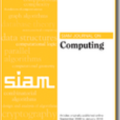In his seminal work, Cleve [STOC '86] has proved that any $r$-round coin-flipping protocol can be efficiently biased by $\Theta(1/r)$. This lower bound was met for the two-party case by Moran, Naor, and Segev [Journal of Cryptology '16], and the three-party case (up to a $polylog$ factor) by Haitner and Tsfadi [SICOMP '17], and was approached for $n$-party protocols when $n< loglog r$ by Buchbinder, Haitner, Levi, and Tsfadia [SODA '17]. For $n> loglog r$, however, the best bias for $n$-party coin-flipping protocols remains $O(n/\sqrt{r})$ achieved by the majority protocol of Awerbuch, Blum, Chor, Goldwasser, and Micali [Manuscript '85]. Our main result is a tighter lower bound on the bias of coin-flipping protocols, showing that, for every constant $\epsilon >0$, an $r^{\epsilon}$-party $r$-round coin-flipping protocol can be efficiently biased by $\widetilde{\Omega}(1/\sqrt{r})$. As far as we know, this is the first improvement of Cleve's bound, and is only $n=r^{\epsilon}$ (multiplicative) far from the aforementioned upper bound of Awerbuch et al.
翻译:克莱夫[STOC'86]在其开创性工作中证明,任何美元回合硬币抛售协议都可能受到美元(美元)的高效偏差。对于莫兰、瑙尔和塞格夫(《密码学杂志》,16年)和海特纳和察法迪(SICOMP'17)多数协议(最高为美元系数)的三方协议(最高为美元),当Buchbinder、Haitner、Levi和Tsfadia[SODA '17] 的美元(美元)的对价时,任何美元回合硬币抛售协议都会受到有效的偏差。对于两方案件而言,美元、Naor和Segevevevev[16年]的对价(美元)的对价约束度较低。 对于Awerbuch、Blum、Choldwasser、Goldwasseral_lickral_lickral_Blickral,我们的主要结果是从硬币联盟的偏差 $(美元)的偏差 和远方的对美元协议。



